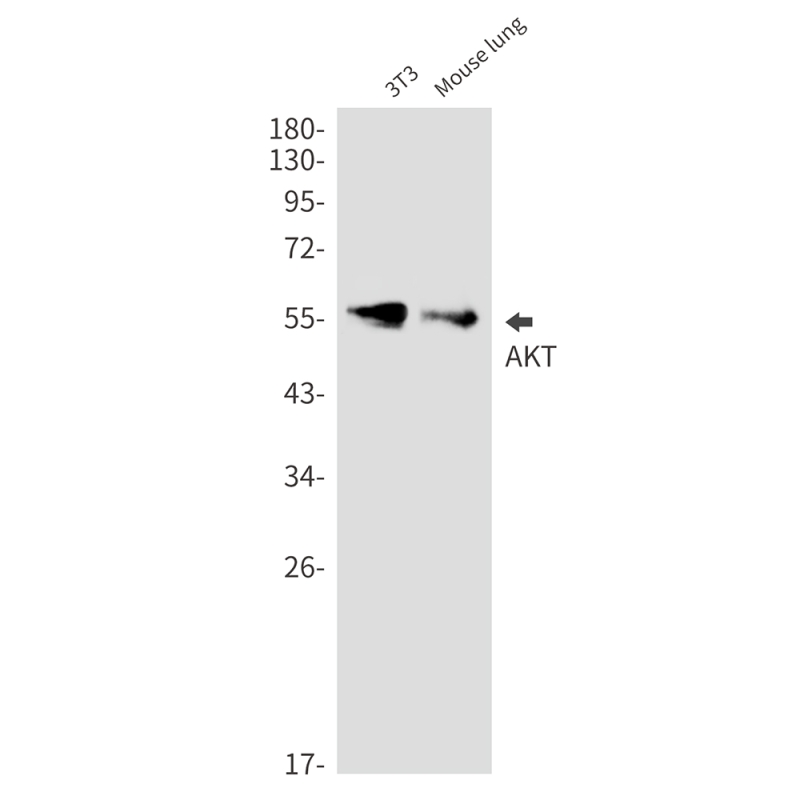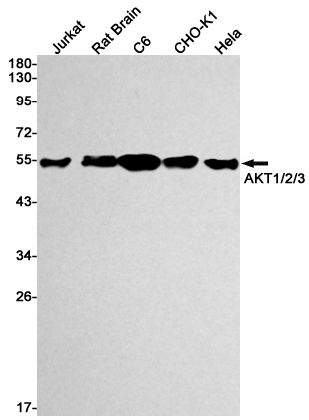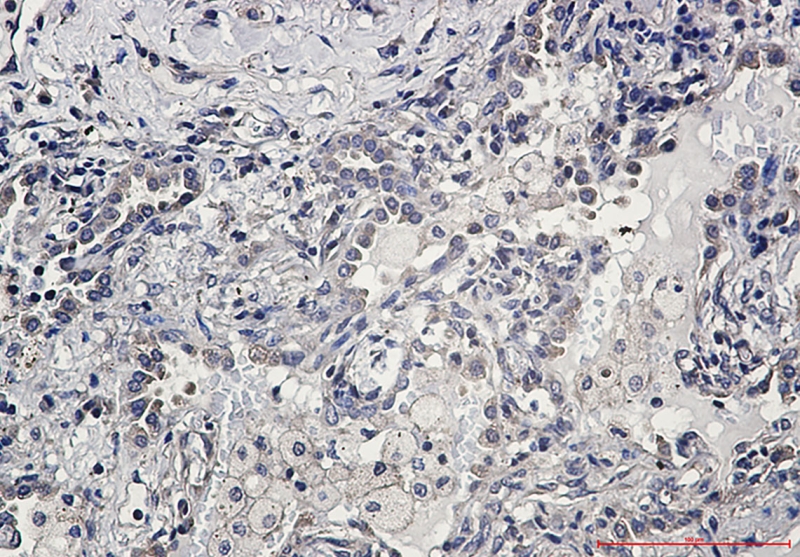


| WB | 1/500-1/1000 | Human,Mouse,Rat,Hamster |
| IF | 1/20 | Human,Mouse,Rat,Hamster |
| IHC | 1/50-1/100 | Human,Mouse,Rat,Hamster |
| ICC | 1/50-1/200 | Human,Mouse,Rat,Hamster |
| FCM | 咨询技术 | Human,Mouse,Rat,Hamster |
| Elisa | 咨询技术 | Human,Mouse,Rat,Hamster |
| Aliases | AKT1 |
| Entrez GeneID | 207/208/10000 |
| WB Predicted band size | Calculated MW: 56 kDa; Observed MW: 56 kDa |
| Host/Isotype | Rabbit IgG |
| Antibody Type | Primary antibody |
| Storage | Store at 4°C short term. Aliquot and store at -20°C long term. Avoid freeze/thaw cycles. |
| Species Reactivity | Human,Mouse,Rat,Hamster |
| Immunogen | Recombinant protein of human AKT1/2/3 |
| Formulation | Purified antibody in TBS with 0.05% sodium azide,0.05%BSA and 50% glycerol. |
+ +
以下是3篇关于AKT抗体的代表性文献,内容涵盖抗体应用与机制研究:
---
1. **文献名称**:*AKT/PKB Signaling: Navigating the Network*
**作者**:Manning BD, Toker A
**摘要**:该综述系统总结了AKT信号通路的关键调控机制,特别强调了不同AKT亚型(AKT1/2/3)抗体的特异性应用,例如通过Western blot和免疫荧光区分亚型表达及磷酸化状态(如Ser473和Thr308位点),为癌症研究中AKT活性检测提供方法学参考。
---
2. **文献名称**:*The role of Akt in the signaling network of mutant EGFR-driven non-small-cell lung cancer*
**作者**:Sordella R et al.
**摘要**:本研究利用磷酸化特异性AKT抗体(如p-AKT Ser473)检测EGFR突变型肺癌细胞中AKT的激活状态,证实AKT信号与EGFR-TKI耐药性相关,并验证了多种商业化AKT抗体的可靠性(如Cell Signaling Technology #9272)。
---
3. **文献名称**:*Characterization of a novel monoclonal antibody recognizing an epitope in the kinase domain of Akt*
**作者**:Lin J et al.
**摘要**:报道了一种针对AKT激酶结构域的新型单克隆抗体的开发与验证,该抗体在免疫沉淀(IP)和免疫组化(IHC)中表现出高特异性,可用于肿瘤组织样本中AKT的定位及表达水平分析。
---
4. **文献名称**:*Comparative analysis of Akt antibodies reveals distinct subcellular localization patterns*
**作者**:Masure S et al.
**摘要**:通过对比多种AKT抗体(包括总AKT及磷酸化抗体),发现不同抗体在检测亚细胞定位(如细胞核/质分布)时存在差异,强调抗体选择对研究AKT功能调控的重要性。
---
以上文献覆盖抗体开发、验证及在癌症研究中的应用场景,可供实验设计参考。如需具体实验方案,建议优先选择Cell Signaling Technology或Abcam等厂商的技术手册进行抗体使用条件优化。
Akt antibodies are essential tools in biomedical research, targeting members of the Akt protein family (Akt1. Akt2. Akt3), also known as protein kinase B (PKB). These serine/threonine kinases play pivotal roles in the PI3K/Akt/mTOR signaling pathway, regulating critical cellular processes including survival, proliferation, metabolism, and apoptosis. Dysregulation of Akt signaling is implicated in cancer, diabetes, and neurodegenerative diseases, making Akt proteins key therapeutic targets.
Akt antibodies are widely used to detect Akt expression, phosphorylation status, and subcellular localization in experimental models. Phospho-specific Akt antibodies, for example, distinguish activated Akt (e.g., phosphorylated at Thr308/Ser473 for Akt1) from inactive forms, enabling studies of pathway activation under various conditions. They are applied in techniques like Western blotting, immunohistochemistry (IHC), immunofluorescence (IF), and flow cytometry.
Researchers must select antibodies based on specificity for Akt isoforms (Akt1 vs. Akt2/Akt3) and post-translational modifications, as cross-reactivity can compromise data interpretation. Validation using knockout controls or siRNA is critical. Commercial Akt antibodies are typically derived from rabbits or mice, with monoclonal or polyclonal formats offering varying sensitivity and specificity.
Beyond basic research, Akt antibodies support drug development by monitoring therapeutic responses to PI3K/Akt inhibitors and serving as biomarkers in clinical samples. Their utility in elucidating disease mechanisms and therapeutic targeting underscores their importance in molecular biology and precision medicine.
×